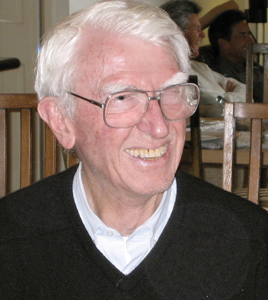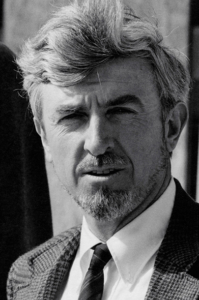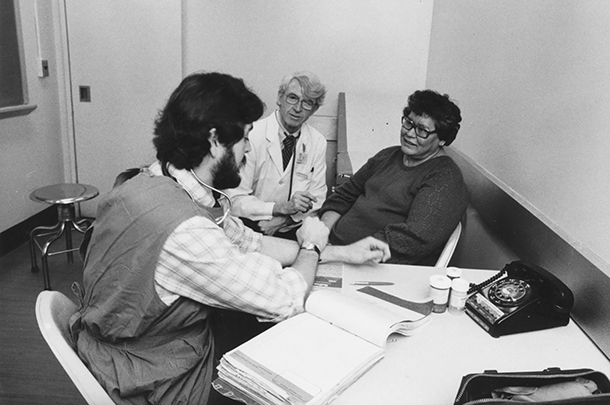
Peter Van Arsdale Lee joined the Keck School of Medicine of USC in 1955 as an assistant professor of pharmacology and assistant dean.
Professor Emeritus Peter V. Lee, MD, former chair of the Department of Family Medicine at the Keck School of Medicine of USC, died July 26. He was 93.
Peter Van Arsdale Lee was born in San Francisco in 1923, and like his father, four brothers and one sister, pursued a career as a physician. He graduated from Stanford University School of Medicine followed by residencies in pathology and medicine at Stanford and NYC Health + Hospitals/Kings County in Brooklyn, New York, and — after completing his residency — returned to teach at Stanford as an assistant professor of pharmacology.
In 1955, Dean Gordon E. Goodhart, MD, recruited Lee to USC as an assistant professor of pharmacology, with an additional appointment as an assistant dean. Once here, he quickly established himself as a teacher and a leader. He taught students in medicine, pharmacy, geriatrics, physician assistant studies and nursing about pharmacology and family medicine. He was a national leader in crafting ways to engage medical students in hands-on learning, including conducting research on best practices in medical education in the early 1960s as well as being one of the creators of the Introduction to Clinical Medicine (ICM) program in 1969.
Lee oversaw the creation of the new Department of Family Medicine in 1983 and became its inaugural chair after its separation from the Department of Family and Preventive Medicine. He was instrumental in the establishment of the USC Family Medicine Residency at California Hospital in 1984 and set up the Family Medicine Clerkship rotation for medical students in their third year.
Lee was committed to social justice, increasing diversity among the medical students and encouraging interdisciplinary teaching. This commitment was reflected in his leadership of the Medical Committee for Human Rights in the 1960s, when the organization was working against discrimination in medicine and providing health services to disadvantaged minority groups. In the late 1980s, when there were still physicians afraid to touch people with AIDS and HIV, he served as principal investigator to establish the AIDS Education and Training Center at USC to train health care providers in this new disease. Through this work, he helped to develop a network of health care providers and educators who went on to fill a critical gap in the system of care available to people with HIV/AIDS. The training he envisioned and implemented became a national model.
Lee received awards for his excellent teaching, leadership and care throughout his career, including having the 1966 USC Medical School yearbook dedicated to him, being recognized as “Outstanding Clinical Science Instructor” by the 1976 graduating class, receiving the Elaine Stevely Hoffman Service Award in 1994, and appointment as the Lorin Stephens Memorial Lecturer at USC in 1995.
Lee retired in 1995, but did not end his commitment to the education and professional development of medical students and faculty alike. As an emeritus faculty member, he continued to serve as an ICM instructor and was instrumental in the development of the Professionalism and Practice of Medicine course, planning the curriculum and working with medical students. Lee also organized an emeritus faculty book club, which allowed him to maintain a “spiritual time” with the faculty, most of whom he worked with at one time or another and which he found to be “a great experience.” The book club is still in existence and he continued to attend until recently.
The Lee family has been at the intersection of health care and politics for generations. When John F. Kennedy pushed for Medicare legislation, Lee was among the small group of physicians that spoke in support of the legislation. When Lee’s public remarks in support of Medicare led to calls for his being removed from the medical school, USC supported his right to free speech. In an interview on the 50th anniversary of the signing of the legislation, Lee said that the country changed overnight with the passage of Medicare and that once-filled hospital hallways were emptied, since older adults now could receive the financial support for their continued care outside a hospital.

Peter Van Arsdale Lee retired in 1995 but continued to serve as an Introduction to Clinical Medicine instructor and formed an emeritus faculty book club.
“Dr. Lee exemplified what a physician should be,” said Laura Mosqueda, MD, the current chair of the Department of Family Medicine. “The reason our department is so focused on the nexus of medical care and social justice traces directly back to Dr. Lee’s influence and his commitment to the underserved.”
Colleagues and friends of Lee will miss him greatly. A number of them have expressed their heartfelt appreciation for his contributions and celebrated his life.
Pamela Schaff, MD, associate dean for curriculum, started teaching ICM in 1986 and remembers Lee as one of her heroes.
“I think Peter’s generosity of spirit is what made him such an incredible mentor and human being. He was humbly brilliant and offered himself, his wisdom, his knowledge and his encouragement in a way that made me feel as if we’d been given the perfect gift. I hope we will honor his legacy by striving to teach, practice, lead and serve as magnificently as he did,” Schaff said.
Peter Katsufrakis, MD, prior associate dean for student affairs and current senior vice president of the National Board of Medical Examiners, noted, “News of Peter’s passing immediately brought to mind the phrase ‘standing on the shoulders of giants.’ Peter did so very much for USC and even more for the people whose lives he touched. I know he will live on in so many of us who benefited from his intelligence, wisdom, grace and humor.”
A close friend, Allan Abbott, MD, former associate dean for curriculum, observed, “Peter was a champion of medical education and cared deeply about his students and his profession. His intellectual and philosophical approach to medicine — and to life — inspired countless others. During my 31 years at USC, he was my mentor — the kind of mentor any faculty member could only hope for.”
Erin Quinn, PhD, MPA, former dean of admissions and current associate dean for Science and Health in Dornsife College of Letters Arts and Sciences, and who worked closely with Lee on many educational programs, wrote, “Peter had incredible leadership skills, including the ability to lead a diverse team, and nurture the talent and quality in all of his team members. His legacy will live on through the many lives that he touched through education.”
Samuel Matheny, MD, MPH, the assistant provost for Global Health Initiatives and professor of Family and Community Medicine at the University of Kentucky, and a former mentee of Lee offered, “Those of us who were fortunate enough to have had Dr. Lee as an attending or preceptor have indelible memories of those experiences. He was USC’s Osler, always invoking in his learners the admonition to focus on the patient rather than the illness. Although he was armed with encyclopedic knowledge, his interactions were collegial and thoughtful, infused with compassion and humor; never intimidating nor a demonstration of his personal expertise, but rather a discussion of how to provide the best patient care.”
Lee is survived by his wife, Belinda Fischer, four children — Martha, Susan, Catherine and Peter — two grandchildren and one great-grandson.
A memorial will be held at 2:30 p.m. Oct. 3 in Aresty Auditorium on the Health Sciences Campus. In lieu of flowers, the Lee Family has requested gifts to be directed to the Peter V. Lee, M.D. Fund for Family Medicine. For more information, go to http://keck.usc.edu/family-medicine/support-us/peter-v-lee.
— Claire Norman


